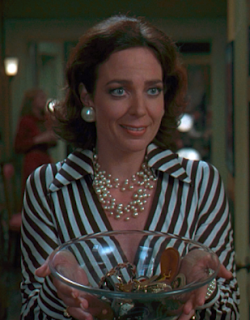20th Anniversary Re-appraisal: Small Soldiers
 |
| Dante doesn't really hide his message |
 |
| Yes, if only the language were more civil in this bloody suburban war movie |
And it should not be viewed alone, as critic Jonathan Rosenbaum understood at the time, Spielberg mentee Joe Dante's Small Soldiers is to Saving Private Ryan (released two weeks later), as his Piranna was to Jaws. Spielberg, in fact, was an early fan of Dante after Piranna, and like a wise, tricky deity, understands that his films deserve satiric critique for their impact on the culture - and it's perhaps no accident that Spielberg's Amblin Entertainment produced and released the ultimate modern war film and this cutting indictment of the cultural and psychological consequences of American war films over the same summer.
Dante said of making Small Soldiers that "originally I was told to make an edgy picture for teenagers, but when the sponsor tie-ins came in the new mandate was to soften it up as a kiddie movie. Too late, it turned out." Although significant chunks of explosive action were removed prior to release, it still earned a PG-13 rating, upsetting Burger King and it's toy-tie in, as they were led to believe this film was a kids movie. Of course, they still marketed the toys. It wasn't a kid's movie -- but we still served it to kids.
In the film, an evil toy company CEO (Mr. Mars) insists on action figures (G.I. Joe like "Commando Elite" American Marines who fight soulful aliens called "Gorgonites") that come to life, and they do: with microchips from the Defense Department. This isn't supposed to make logical sense, it's a blunt metaphor -- our American toys are imbued not with the spirit of imagination, but infected with the virus of consumption and God of war.
 |
| Dante, like Spielberg, calls back to Kubrick, asking to be taken seriously |
There are moments of brilliance (as well as flaws) in the film. In his last film role, Phil Hartman plays a parent who falls asleep in front of the TV as his kids are engaged in violent struggle -- as obvious as a prophetic metaphor can get. Before falling asleep he utters the film's best line, viewable on the right -- a line you can imagine millions of Saving Private Ryan baby boomer fans muttering themselves.
There are also brilliant references to the Bride of Frankenstein, mind control (a running theme of 90s pop culture), and even the Kennedy assassination. Look closer, as the following year's Best Picture winner would beg of us. Question everything.
 |
| Recognize the outfit? |
 |
| Talk about a Military-Industrial complex. |
My favorite part of the film is an odd little scene where Alan and the Gorgonites talk about reality bubbles, as the alien dolls speculate on the existence of their Utopia, Gorgon, somewhere beyond the internet and the mall and the known cinematic reality of the Spielbergian suburb. "And what's beyond that?"
If you haven't seen it, check it out. It's a fascinating movie from a talented director.


Comments
Post a Comment